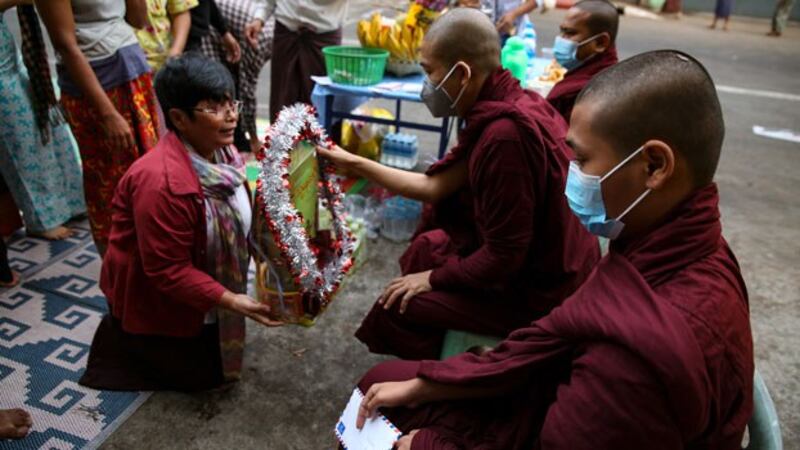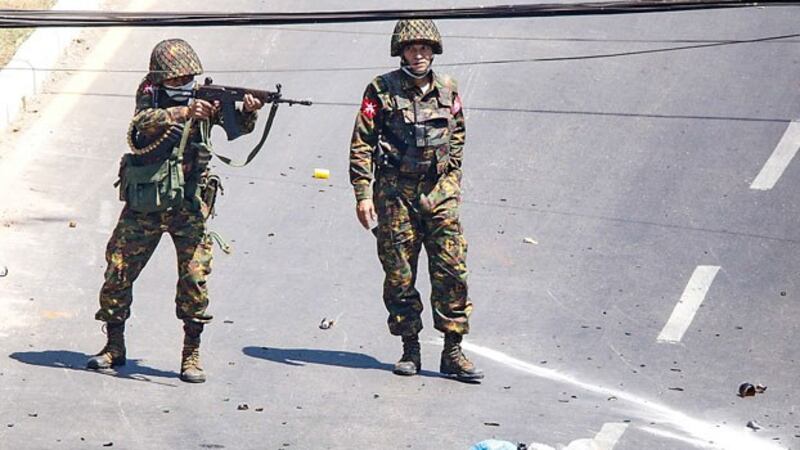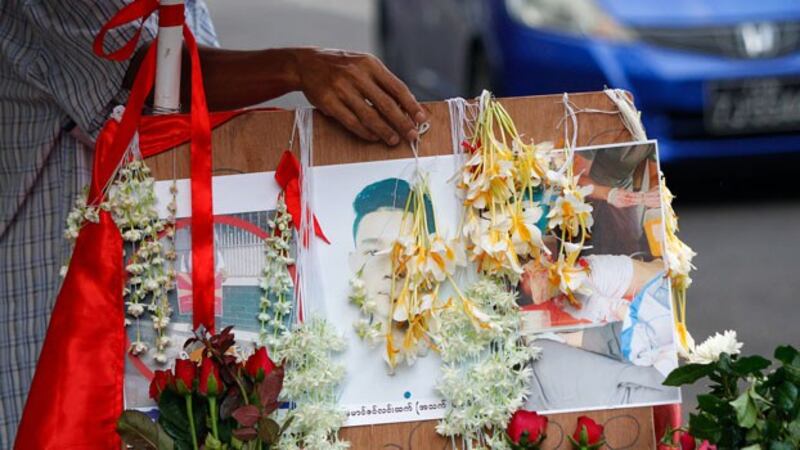A teenager was shot dead after taunting soldiers and at least six anti-junta protesters were injured Tuesday when security forces used tear gas, stun grenades, and gunfire to break up demonstrations across Myanmar.
More than a month after a military coup deposed the elected government of Aung San Suu Kyi, defiant anti-coup protesters marched through the streets of cities across Myanmar, despite the use of lethal force by police and soldiers that killed at least 20 people on Sunday.
In the central region of Magway, 16-year-old Thiha Zaw was shot dead by a soldier on a passing convoy of three military trucks after boys he was with shouted anti-junta slogans and flashed a three-finger salute of defiance at the troops, a witness told RFA. The soldiers then loaded Thiha Zaw’s body onto their truck and left the scene, and the army later informed villagers to retrieve it.
RFA has confirmed 24 deaths across Myanmar since the military takeover on Feb. 1.
In Yangon, police and soldiers fired shots into the air to scare off protesters in the morning, but resorted to using excess force to break up rallies in the afternoon.
Violent crackdowns occurred at the city’s Hledan and Myae Ni Gone junctions, popular protest sites where two demonstrators were arrested. Police and soldiers used rubber bullets, smoke bombs, and slingshots to disperse protesters on Kamayut Station Road on the outskirts of the city.
In Kalay, a town in northwestern Myanmar’s Sagaing region, four people were injured in a crackdown, with two of them in critical condition, witnesses said, adding that police used live rounds to quell protests.
“They first threw stun grenades at us, and this was followed by three or four rounds of tear gas,” said a protester, adding that residents and students told police they would take down their street barriers to open the road they had blocked.
“But they ignored our requests and tried to grab our makeshift shields away,” he said. “Some people were recording them as they tried to break us up. When we resisted and fought back, they began shooting.”
In Dawei, capital of Tanintharyi region in southern Myanmar, protesters marched through the streets to the house of Lwin Oo, a demonstrator who died of gunshot wounds on Feb. 28, and were set upon by security forces.
“We were paying our respects to the man who died the other day during the protest, and the police followed us to the house and sprayed tear gas to disperse us,” said Dawei resident Min Lwin Oo.
In the Irrawaddy River town of Magway, authorities on Monday released 19 of the 57 protesters arrested on Feb. 28 and charged the others with incitement, a violation that carries a maximum two-year sentence, a fine, or both.
In Hpa-an, capital of eastern Kayin state, locals said they postponed their protest plans for a day because of the huge presence of soldiers and police in the city. Police set up a checkpoint on a bridge at the city’s main entrance and searched photo studios and shops that make vinyl protest posters used by demonstrators.
“The police came to look for evidence to see whether we were producing vinyl posters or the plastic shields that the protesters were using,” said one shopkeeper. “I heard they searched all the shops in town.”

Reporters locked up
Similar protests continued in other towns across Myanmar, including Pathein and Myitkyina and in the Chin state towns of Mindat, Matupi, Htantalan and Hakha. Authorities charged three protesters arrested in the town of Falam on Feb. 28 with incitement.
The Assistance Association for Political Prisoners, a watchdog group, said that as of Tuesday, 1,294 people had been arrested, charged, or sentenced in relation to the military coup, with 988 still being held and about 300 released.
The number of arrestees includes 29 reporters picked up across the country since Feb. 1. Some of them have been released, though others face defamation charges.
An RFA tally indicates that three reporters have been charged with criminal defamation for covering the anti-coup protests, while about 10 others are in detention, some of whom are in Yangon’s infamous Insein Prison on the city’s outskirts. The whereabouts of some are unknown.
Paris-based Reporters Without Borders said Tuesday that there are at least 11 reporters currently being detained on charges under Section 505(a) of Myanmar’s Penal Code for allegedly spreading false information. If found guilty, they could face up to two years in prison.
On Monday, the Committee to Protect Journalists called on the junta to immediately release all journalists detained for their work and to allow reporters to cover protests without fear of reprisal.
Police and soldiers in seven military vehicles arrested DVB news reporter Aung Kyaw at his home Monday night in Myeik, Tanintharyi region, without giving a reason, his wife said.
“We do not know where he has been taken. … When they found him, some of the soldiers said he was the guy who was doing a live broadcast in the afternoon,” she said. “I believe they want to put the country’s media under the military administration.”
Earlier that day, Aung Kyaw did a live interview with protesters who were injured during a crackdown by police and soldiers in one of the city's wards.

‘A lawless state’
Five other reporters — Kay Zun Nway of Myanmar Now, Aung Ye of 7Day News daily newspaper, Thein Zaw of the Associated Press, Ye Myo Khant of the Myanmar Pressphoto Agency, and Hein Pyae Zaw of Zeegwet Journal — remain in detention after their arrests on Feb. 27 while covering protests.
Nila Khine, a high court lawyer who has taken up their cases, said that Kay Zun Nway is being held at the Sangchaung township police station on defamation charges.
“We already have a remand for her,” the attorney said. “I don’t think she will be brought to court. The case will be heard by video conference.”
The Foreign Correspondents Club of Myanmar said Thein Zaw also faces defamation charges, while J Paing of the Myanmar Pressphoto Agency said photographer Ye Myo Khant faces defamation charges.
On Feb. 24, reporters Tin Mar Swe of MCN-TV news and Khin May San of The Voice went to a police station in the town of Monywa, Sagaing region, for information about a video shot two days earlier in which local residents questioned a suspicious person in their ward at night. But instead, the two reporters were arrested on defamation charges.
On Feb. 28, authorities arrested freelance reporter Shin Moe Myint, Kyaw Ne Min of the Choon Journal, Ye Yint Tun of Pathein-based Than Daw Sint News, and Lin Tun of Ramanya news agency. Shin Moe Myint was freed Tuesday morning, according to police.
Police Colonel Tun Shwe of the Ayeyarwady region police headquarters told RFA that Ye Yint Tun, currently held in Pathein Prison, had been charged with defamation, but declined to say why he had been charged or who had opened the case against him.
“We want him to be released,” said Ye Yint Tun’s sister. “He’s a journalist, and he’s doing his job. I don’t think he is in the wrong, so he should be released immediately.”
Police arrested Salai David of the Chinland Post in Hakha on Monday but released him Tuesday afternoon.
“We must realize that the current situation is a lawless state, and we cannot have protection from the law,” said Zayar Hlaing, a veteran journalist and former member of the Myanmar Press Council. “So, reporters must be on alert at all times and think of their safety first. Since we do not have protection under the law, we have to run if necessary.”

Civil servants suspended
The junta meanwhile suspended 12 tax and revenue workers under the Ministry of Planning, Finance and Industry for joining the civil disobedience movement on Feb. 26, a suspended deputy customs official told RFA on Tuesday.
The 12 affected civil servants are customs inspectors, deputy custom inspectors, accountants, and clerks, said the official who declined to be named for safety reasons.
An internal memo issued on Feb. 26 said the 12 were found to have failed to perform their duties without good reason in violation of regulations, he said. It was signed by Aung Khine, the department director, on behalf of the director general of the Customs Department.
“I believe this move is to make an example of us so to show other employees that those who join the movement will face this kind of punishment,” he said. “It’s like a deterrent for others to stop them from joining the civil disobedience movement.”
“During my 14 years of service with the department I have seen many such oppressive actions from these ex-military officials,” added the customs official.
Government employees across the country who have stopped working to protest against the military regime increasingly are being fired and their families evicted from government housing. Some have been charged with violating government regulations.
The Committee Representing Pyidaungsu Hluttaw, a national legislative body led by National League for Democracy legislators elected in the 2020 elections, has said that striking civil servants will be able to return to their jobs when the elected civilian government returns to power.
Several police officers have joined forces with striking civil servants and protesters to denounce the military regime.
Tin Min Tun, acting police major at the news and information unit of the Yangon Region Police Force, joined the anti-coup movement on Sunday, live-streaming on social media interviews he conducted with fellow officers.
He asked the officers how they could expect young people to want to join the police force after police had committed crimes ordered by the leaders of the coup, and how they could face their children and grandchildren after violently attacking protesters.
Tin Min Tun said he joined the civil disobedience movement because he could no longer tolerate what was happening.
He also said that the image of the police force had become tarnished because officers have been sacrificed by the military to commit violent crimes on its behalf.
Reported by RFA’s Myanmar Service. Translated by Khin Maung Nyane. Written in English by Roseanne Gerin.
